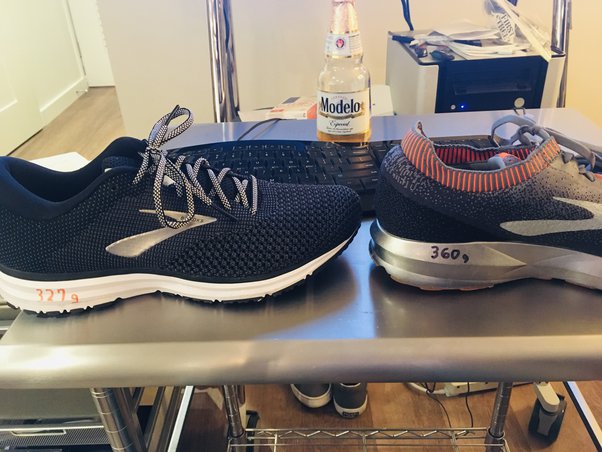Have you ever wondered how much weight those trendy shoes of yours add to your overall body weight? It’s a question many people ask, and today we’re here to explore the answer. So, how much weight do shoes really add? Let’s dive in and find out!
Thank you for reading this post, don't forget to subscribe!Well, when it comes to shoes, the weight can vary depending on the type of shoe and its materials. Sneakers, for example, tend to be lighter compared to heavy-duty work boots. But regardless of the style, it’s safe to say that shoes do add some weight to your body when you’re wearing them. It may not be a significant amount, but every little bit counts, right?
You might be thinking, “Why does it even matter how much weight shoes add?” Well, it can actually have an impact on various activities you do throughout the day. Whether it’s running, hiking, or simply walking around, the weight of your shoes can affect your comfort level and energy expenditure. So, let’s put on our investigative caps and uncover the mysteries of shoe weight together!
How Much Weight Do Shoes Add: Unraveling the Truth
Shoes are an essential part of our daily lives, providing comfort, protection, and style. But have you ever wondered how much weight do shoes add? It’s a question that many people have, especially those who are conscious of their weight or engage in activities that require them to carry heavy loads. In this article, we will delve into the world of shoes and explore the factors that contribute to their weight. From the materials used to the design elements, we will uncover the truth behind how much weight shoes actually add.
Materials Matter: The Impact of Shoe Construction on Weight
When it comes to the weight of shoes, one of the primary factors to consider is the materials used in their construction. Different types of shoes utilize varying materials, each with its own weight characteristics. For example, running shoes often incorporate lightweight materials such as mesh or synthetic fabrics to reduce weight and enhance breathability. On the other hand, hiking boots may feature heavier materials like leather and rubber for added durability and protection.
Additionally, the sole of a shoe plays a significant role in its weight. Some shoes may have thick, cushioned soles for shock absorption, while others may have thinner, more lightweight soles for a minimalist feel. The type of sole also varies based on the intended activity, with athletic shoes typically having lighter soles compared to work boots or hiking shoes. Ultimately, the materials used in the construction of a shoe, including the upper, midsole, and outsole, can significantly impact its overall weight.
Design Elements: How Style Choices Influence Shoe Weight
While materials contribute significantly to the weight of shoes, design elements also play a crucial role. From the shape to the additional features, these design choices can add or subtract weight from the final product. Let’s explore some of the key design elements and their impact on shoe weight.
1. Heel Height: High-heeled shoes tend to be heavier due to the added height and additional materials required to support the arch of the foot.
2. Supportive Structures: Shoes designed for athletic activities, such as basketball or running, often incorporate supportive structures like air cushions, gel inserts, or external frames, which can increase their weight.
3. Decorative Embellishments: Shoes adorned with intricate embellishments, such as beads, sequins, or heavy stitching, can add extra weight purely for aesthetic purposes.
4. Additional Features: Some shoes may come equipped with features like ankle straps, metal buckles, or zippers, which can contribute to the overall weight.
By understanding these design elements, you can make informed choices when selecting shoes that align with your desired weight and functionality.
The Impact of Shoe Weight on Performance
The weight of shoes can have implications for various aspects of performance, such as athletic endeavors or daily activities. Let’s explore how the weight of shoes can influence performance in different scenarios.
1. Athletics: In sports like running, lighter shoes can lead to improved performance by reducing fatigue and allowing for faster movements. However, it’s essential to strike a balance between weight and required support to prevent injuries.
2. Everyday Wear: When it comes to everyday shoes, the weight may not have as significant an impact. However, the comfort and fit of the shoes are crucial for overall foot health and preventing discomfort or pain.
3. Occupational Footwear: In occupations that require workers to be on their feet for extended periods, the weight of the shoes can play a role in fatigue and potential foot or leg pain. Shoes should provide adequate support and cushioning without being overly heavy.
In conclusion, the weight of shoes is influenced by various factors, including the materials used and design elements incorporated. While the weight may vary depending on the type of shoe and its intended purpose, it’s crucial to find a balance between weight, functionality, and comfort. By understanding these dynamics, you can make informed choices when selecting shoes that best suit your needs and lifestyle. So, the next time you slip on a pair of shoes, remember that they not only add style to your outfit but also contribute to your overall experience and performance.
Key Takeaways: How Much Weight Do Shoes Add?
2. Heavier shoes, such as boots, tend to add more weight than lighter shoes like sandals.
3. On average, a pair of shoes can add around 1-2 pounds to your overall weight.
4. The extra weight from shoes may affect your balance and overall performance in sports or physical activities.
5. It’s important to choose shoes that provide proper support and comfort without unnecessarily adding too much weight.
Frequently Asked Questions
Welcome to our frequently asked questions section on how much weight shoes add! Here, we’ll address common queries about the weight impact of shoes.
1. Are shoes heavy in general?
Shoe weight can vary depending on certain factors like the style, materials used, and purpose. While some shoes are designed to be lightweight, offering greater comfort and agility, others may be heavier due to additional features or robust construction. Therefore, it’s important to consider the specific type of shoe you’re referring to when thinking about weight.
For instance, athletic shoes or sneakers usually strive to minimize weight to enhance performance. On the other hand, work boots or hiking shoes may prioritize durability and protection, resulting in a slightly heavier weight. Ultimately, it’s all about finding the right balance between weight and functionality for the intended use of the shoes.
2. How much weight do shoes generally add?
The weight added by shoes can vary across different types and sizes. The average weight range for a pair of shoes is typically between 1 to 3 pounds, or around 0.45 to 1.36 kilograms. However, it’s essential to note that this range can change depending on factors such as shoe size, shoe style, and the materials used in their construction.
Additionally, some specialized shoes, like steel-toed work boots or mountaineering boots, may weigh more due to their reinforced components. Conversely, minimalist or ultra-lightweight shoes can weigh significantly less. Remember, the weight of shoes should be considered in relation to their intended purpose and personal preference.
3. Do different shoe materials impact their weight?
Yes, absolutely! The materials used in the construction of shoes play a significant role in determining their weight. While traditional leather shoes tend to be heavier, synthetic materials like mesh or lightweight foam can reduce shoe weight. However, lightweight materials might sacrifice certain qualities like durability or support, so it’s crucial to consider the specific requirements of the shoes.
In recent years, shoe manufacturers have been actively exploring and developing new materials that offer lightweight properties without compromising on performance. These advancements have allowed for the creation of shoes that are significantly lighter than their traditional counterparts, making them more comfortable to wear for extended periods.
4. Can shoe weight impact physical performance?
The weight of your shoes can indeed have an impact on your physical performance, particularly in activities that involve running or any other form of repetitive movement. Heavy shoes may impede natural movement, leading to decreased speed, agility, and increased fatigue.
However, it’s important to strike a balance between lightweight and adequate foot support. Choosing shoes solely based on weight can be detrimental if they lack proper cushioning or arch support, potentially leading to discomfort or even injury. So, while lightweight shoes can enhance performance, ensuring they still provide the necessary support is crucial.
5. Can shoe weight affect posture or joint health?
Shoe weight can indirectly impact posture and joint health, especially when it comes to shoes that lack proper support or are excessively heavy. Poorly fitting or weighty shoes can disrupt your natural gait, potentially causing imbalance or placing strain on joints, particularly in the feet, ankles, knees, and hips.
Research suggests that heavier shoes can contribute to increased vertical ground reaction forces, potentially affecting joint loading and increasing the risk of lower extremity injuries. Therefore, it’s essential to choose shoes that provide adequate support, cushioning, and are suited for your specific activity level to maintain healthy posture and joint wellbeing.

Shoe Lift
Summary
Have you ever wondered how much weight your shoes add when you step on a scale? It turns out that shoes can vary in weight depending on their style and material. On average, a pair of shoes can add anywhere from 1 to 2 pounds to your overall weight. So if you’re trying to get an accurate measurement of your body weight, it’s best to take off your shoes before stepping on the scale.
But why do shoes weigh this much? Well, it’s because they have soles, padding, and other components that make them comfortable to wear. While the added weight might not seem like a lot, it can make a small difference when it comes to tracking your weight. So remember, next time you weigh yourself, take off those shoes to get a more precise measurement.

